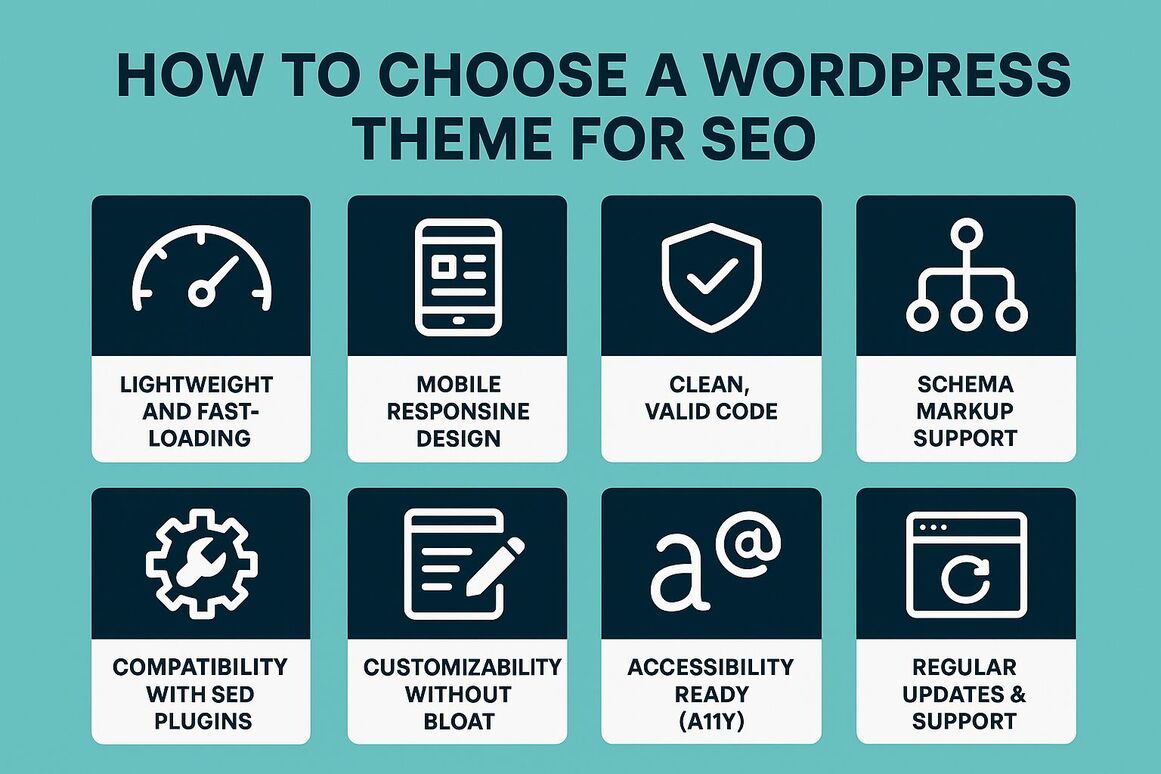Choosing the right WordPress theme isn’t just about looks — it’s a critical decision that impacts your site’s SEO, speed, usability, and ranking. Whether you’re building a blog, business site, or online store, your theme lays the foundation for your website’s performance.
In this article, we’ll guide you through how to choose an SEO-friendly WordPress theme that helps your content rank higher and delivers an outstanding user experience.
Why Your WordPress Theme Affects SEO
A poorly coded or bloated theme can:
- Slow down your website
- Generate errors that confuse search engines
- Compromise mobile responsiveness
- Create accessibility issues
- Lack proper HTML structure for search engines to crawl
Google cares about page speed, mobile usability, and core web vitals — all of which are directly influenced by your theme.
Key Features of an SEO-Friendly WordPress Theme
1. Lightweight and Fast-Loading
Themes packed with unnecessary features or animations slow down load times. Look for themes optimized for performance with minimal CSS/JavaScript.
✅ Tip: Test theme demos with Google PageSpeed Insights or GTmetrix.
2. Mobile Responsive Design
Google uses mobile-first indexing, so your theme must adapt to all screen sizes.
Look for:
- Mobile-friendly menus
- Fluid grid layouts
- Touch-optimized elements
3. Clean, Valid Code
Choose a theme that follows WordPress coding standards and uses semantic HTML. Clean code helps search engines better understand your content structure.
4. Schema Markup Support
Themes with built-in schema support (like breadcrumbs, articles, products, and reviews) can help you appear in rich results or featured snippets.
5. Compatibility with SEO Plugins
Your theme should work flawlessly with top SEO plugins like:
- Yoast SEO
- Rank Math
- All in One SEO Pack
Avoid themes that override SEO plugin settings or use hardcoded meta tags.
6. Customizability Without Bloat
Choose themes that are flexible but not bloated. Popular, well-coded themes like Astra, GeneratePress, or Kadence offer deep customization while staying lightweight.
7. Accessibility Ready (a11y)
SEO also overlaps with usability. An accessible theme ensures all users — including those with disabilities — can navigate your site, which can reduce bounce rates and improve rankings.
8. Regular Updates & Support
An outdated theme may lead to security vulnerabilities and SEO issues. Check:
- Update frequency
- Active installations
- User reviews and developer responsiveness
Themes to Avoid
- Themes with outdated last update dates
- Bundled themes with dozens of unnecessary sliders or page builders
- Themes with inline CSS overload and no separation of style/content
Final Tips Before You Buy or Install
- Test the theme demo on mobile and desktop.
- Use tools like WAVE to test accessibility.
- Check SEO audits of the theme demo using tools like Screaming Frog or Ahrefs.
- Prefer themes from trusted developers or the WordPress repository.
✅ Recommended SEO-Friendly WordPress Themes
- Astra – Lightweight, fast, and WooCommerce compatible
- GeneratePress – Extremely fast and minimal
- Kadence – Modern, feature-rich with performance in mind
- Neve – Flexible and optimized for speed
- Blocksy – Built for Gutenberg, with clean code
Conclusion
Choosing the right theme is one of the first — and most important — SEO decisions you’ll make. It affects everything from how fast your site loads to how search engines crawl it. Go with a theme that’s built with performance, responsiveness, and clean code in mind.
Invest time choosing the right theme now, and your SEO will thank you later.
Would you like this as a downloadable checklist, or need a version tailored for beginners or e-commerce sites?

